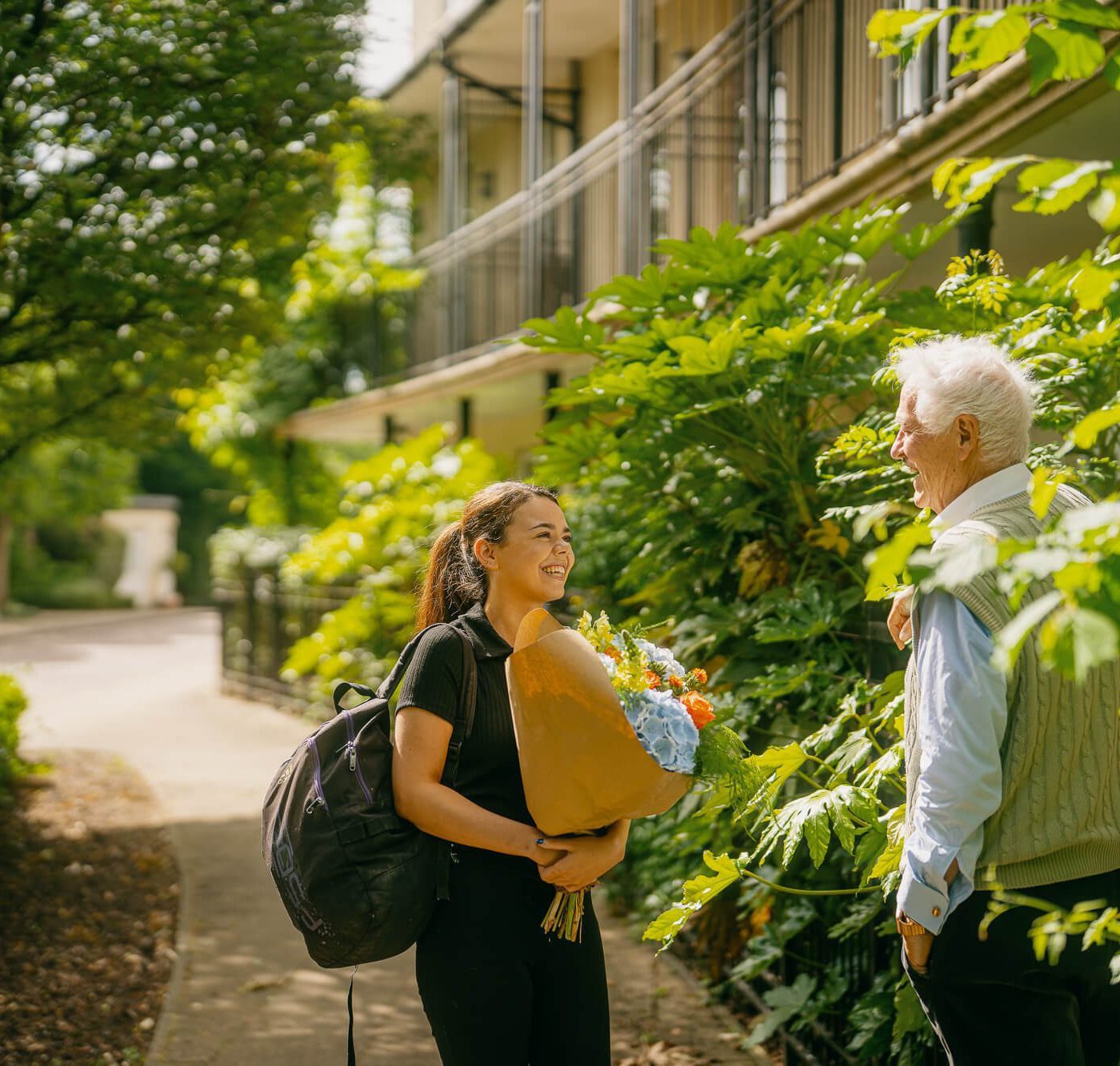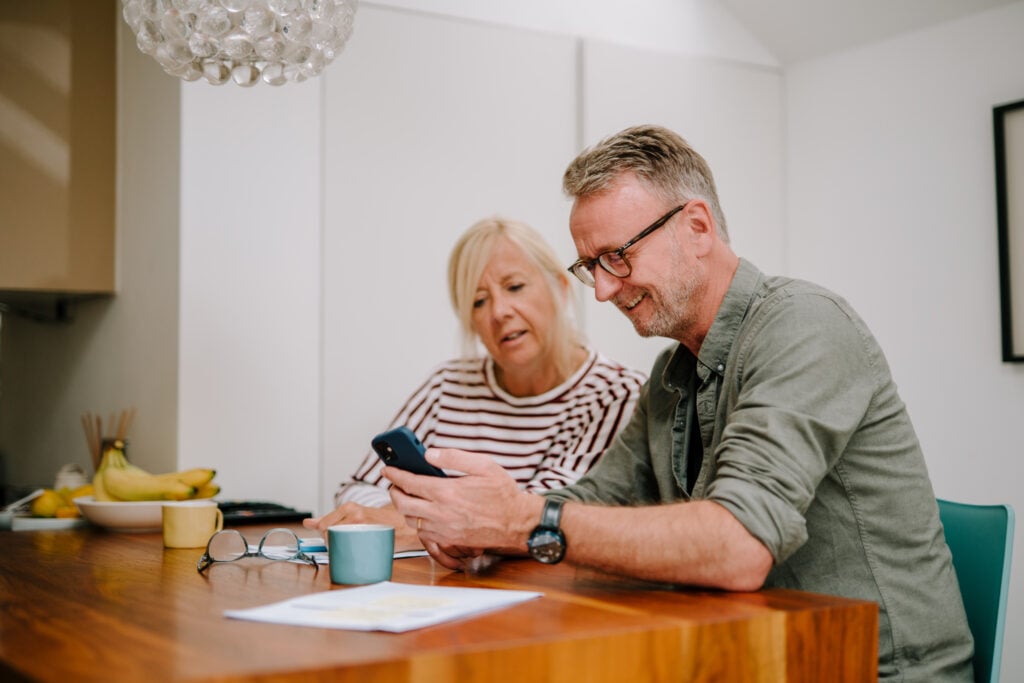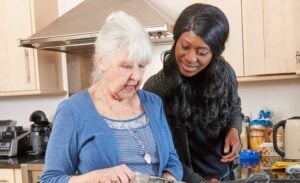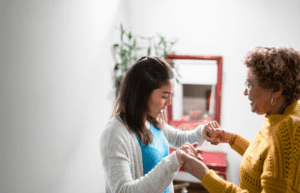How to prepare for a live-in caregiver
Tags
Care at Home for the Elderly: A Guide for Caregivers
Deciding that your loved one will benefit from a live-in caregiver is a significant step. This guide will help you understand the essential preparations to ensure a comfortable and supportive environment for both your loved one and their carer.
Before care at home begins, it’s vital to ensure your loved one knows the carer will be living with them and is comfortable with this. If your loved one needs dementia care or is sometimes confused, this transition might be more challenging. We’ve shared resources that can help, including organisations that support the dementia experience, as well as guidance on how to navigate care refusal.
Essential preparations before the live-in carer arrives
Getting ready for a live-in carer means making sure your loved one’s home is set up to support both them and their dedicated caregiver.
Providing a comfortable private space
A carer who moves into your loved one’s home will need their own private space where they can sleep and spend time when they’re not actively providing care. Being a caregiver 24/7 can be physically and emotionally demanding, so it’s important for them to have somewhere to relax and unwind, even if they get along wonderfully with your loved one.
Most often, this will be a private bedroom within your loved one’s home. If a separate bedroom isn’t available, another private room like a study could be adapted for their exclusive use. What’s crucial is that this room is private and not used as a walkthrough to other parts of the home (for instance, it shouldn’t be the only way to get to the kitchen).
There’s no need for extensive redecoration. The carer’s room simply needs to be comfortable, clean, and have adequate heating. Before they move in, ensure the room is thoroughly cleaned and fresh bed linen is provided. Besides a bed, the private live-in carer will need basic storage, like a wardrobe and chest of drawers. A comfortable chair and a TV, though not essential, can help them feel more at home in your loved one’s house.
Bathroom access and facilities
While it would be preferable for the live-in carer to have their own bathroom, it’s not always necessary. They will need access to clean and functional bathroom facilities within your loved one’s home. If they’ll be sharing a bathroom with your loved one, make sure there’s a convenient spot for the carer to store their toiletries. In some specific care situations, such as advanced dementia, having a separate bathroom can sometimes be helpful to maintain a consistent environment for the care recipient.
Internet access (WiFi)
Even if WiFi hasn’t been a big part of your loved one’s life until now, it’s essential for many people today to stay connected with family and friends. The internet is also useful for the carer to communicate with Elder and update care logs, which helps your wider family stay informed. If your loved one’s home doesn’t have WiFi, it’s a good idea to set up a connection for the live-in carer to use and provide them with the password. This is especially important in rural areas where mobile signals might be weak.
Kitchen facilities and mealtimes
Live-in carers will prepare regular, nutritious meals for your loved one. Often, they’ll eat together, depending on your loved one’s preferences and needs. The carer won’t need separate cooking facilities, but will use your loved one’s kitchen. If the carer has specific dietary needs (e.g. if they are gluten-free), they will typically provide their own special food items. Eating together can help build a positive relationship between your loved one and their carer. You can discuss arrangements for food allowance and grocery shopping when planning the care.
Insurance considerations
It’s important for you to inform your loved one’s home insurance provider that a live-in caregiver will be residing in the home, as this might affect the household insurance policy.
If your loved one has a car that the carer may need to use, ensure the carer is added to their car insurance policy. This is crucial if their duties, such as companionship care, involve driving your loved one to visit friends, enjoying trips out, or running errands like shopping or picking up prescriptions.

Ian's live-in care story
“Having someone different in the house was a big thing for by parents. Carers have to fit around my mother and learn how she and my dad like things done.
“We have now found Donika, she fitted in very quickly! She always goes the extra mile.”
Financial management and household expenses
The live-in carer will likely handle various household expenses and run errands for your loved one. You’ll need to decide how you’d like to manage these. A simple method is to provide petty cash, asking the carer to keep receipts and a clear record of expenditure.
Alternatively, you might prefer to set up a separate bank account with a debit card that the carer can use for day-to-day needs. Whichever method you choose, it’s important that both you (or your family) and the carer clearly understand what is expected regarding financial management.
Housekeeping and daily chores
As part of their role, the live-in carer will help with various housekeeping tasks to keep your loved one’s home comfortable and clean. This can include:
- Cleaning: Washing dishes, cleaning surfaces, vacuuming, dusting, and generally tidying living areas, bathrooms, and kitchens.
- Laundry and ironing: Managing your loved one’s laundry and ironing their clothes.
- Preparing meals and snacks: As mentioned, they’ll prepare meals and ensure the kitchen is tidy afterwards.
- Shopping and errands: Collecting groceries, going to the Post Office, picking up prescriptions, and accompanying your loved one to appointments or on outings.
These tasks are included in the care package to ease daily responsibilities for your loved one.
Security measures
Elder’s live-in carers undergo thorough recruitment procedures, including DBS checks or PVG checks in Scotland. We also ask carers to provide verifiable references from their previous workplaces.
For everyone’s peace of mind and to avoid any misunderstandings, it’s a good idea to keep cash and valuable items secure in your loved one’s home. This is a common practice whenever someone new comes into a home and is especially important if your loved one is living with dementia and might sometimes misplace items.
Essential information for the live-in carer
Providing the live-in carer with key information about your loved one and the household will enable them to offer the best possible support and manage any situations effectively.
Personal and emergency contacts
Prepare a list of people the carer can contact in an emergency. Remember to ask these individuals for their permission before adding them to the list. Include their home phone number and mobile number, along with their relationship to your loved one (e.g. “daughter,” “close friend,” “neighbour”). Ideally, have at least three people on your list, but feel free to add more if you have a wide circle of people willing and able to help.
Medical contacts and information
This list should include your loved one’s GP, dentist, optician (if relevant), and any other healthcare professionals supporting them. Beyond contacts, a comprehensive, personalised support plan should be created. This plan will detail your loved one’s specific medical needs, medication schedules, how to communicate with their healthcare team, and information about attending physiotherapy or medical appointments.
Display this list, along with the emergency contacts, in a prominent location, ideally near a phone in your loved one’s home. This document stays in the home for easy reference, especially when carers hand over shifts.
Daily routine and preferences
You might find it helpful to map out your loved one’s daily routine on a planner you can stick on the fridge. This can make the transition to home care smoother. Starting care for the first time can sometimes feel confusing or upsetting for your loved one, so anything you can do to help everyone feel comfortable and respected will be invaluable.
If your loved one requires dementia care, sticking to a routine might be especially important. If you are arranging care for a loved one on their behalf, but they need a less involved level of care, such as companionship care, they’ll be able to discuss their requirements directly with their carer.
Don’t be afraid to ask questions
It can be helpful to speak with friends and relatives who have previously arranged home care. They can share what to expect and offer valuable advice. You can also read the experiences of other Elder customers.
Fostering a positive relationship with the carer
Building a strong, trusting relationship between your loved one and their live-in carer is key to successful long-term care and your loved one’s overall well-being.
Open communication and expectations
From the very beginning, encourage open dialogue between your loved one, your family, and the carer. Discuss expectations, routines, and preferences openly. Remember that adjusting to a live-in carer takes time for everyone involved. While a formal “trial period” isn’t always set, know that it can take a few weeks for everyone to settle into a comfortable rhythm. Patience and understanding during this initial period are vital for a smooth transition.
Welcoming the carer
When the carer arrives, take the time to show them around your loved one’s home. Explain how appliances work and clearly show them where essential items are stored. It can also be helpful to point out important utility controls like the stopcock and the fuse board.
Respecting boundaries and privacy
Just as the carer needs their private space, it’s important to discuss and establish mutual boundaries. This includes privacy preferences, any guest policies, and acceptable living spaces within your loved one’s home. There might be certain rooms you (or your loved one) prefer the carer not to enter if they’re not necessary for care. Clear communication about these boundaries ensures mutual respect and a harmonious living arrangement for everyone.

Preparing for your carer checklist
Click below for a free PDF checklist that outlines what you’ll need, room by room. This handy guide will help you ensure no detail is overlooked as you prepare for your loved one’s live-in carer’s arrival.
Frequently Asked Questions
Here are some common questions families ask when preparing for a live-in carer:
What is a live-in carer entitled to?
A live-in carer is typically entitled to their own private and undisturbed room within your loved one’s home, access to clean and functional bathroom and kitchen facilities, and designated breaks (e.g. typically 14 hours per week). They should also have reliable access to WiFi.
Does a live-in carer need their own bathroom?
While a private bathroom is ideal for a carer’s comfort, it is not always a strict requirement. Live-in carers primarily need access to clean and functional bathroom facilities within your loved one’s home, which can be shared with the care recipient.
Do I need to pay for a live-in carer’s WiFi?
Providing WiFi access for your live-in carer is highly recommended and generally expected. It enables them to stay in touch with their own family, manage care logs, and access essential information, contributing to their well-being and ability to perform their duties.
What household tasks can a live-in carer help with?
Live-in carers can assist with a comprehensive range of household tasks as part of their agreed care package, including cleaning, laundry, ironing, meal preparation, shopping, and running errands.
How long does it take for a live-in carer to settle in?
It can take a few weeks for both the care recipient and the live-in carer to adjust to the new arrangement and settle into a comfortable routine. Patience and open communication during this initial period are key to a smooth transition.





